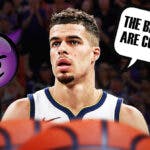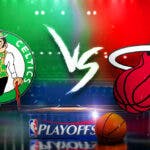While the impending trade of Kyrie Irving to the Boston Celtics is very much a thing of the past, the story of why he chose to part ways with the Cleveland Cavs and their cornerstone player LeBron James is still a pressing matter to those in search of a rationale for his departure.
Irving was coming off three straight trips to the NBA Finals, feat which he didn't come close to sniffing even once during his first three seasons in the league; relegated to being the face of the franchise for a team that failed to get back to its previous Eastern Conference potential.
According to longtime reporter Peter Vecsey, Irving had grown to resent James and the way the Cavs organization had tailored every bit of the offense around its prodigal son.
“As much as he disliked the environment tailored to LeBron’s ball-halting, body-stagnating style — which Irving was encouraged by Tyronn Lue to clone in order to exploit his fabulous finishing touch, and make the Cavs twice as dangerous — he resisted crabbing about it, and waited wearily for the least unfavorable time to ask out. Did Kyrie resent LeBron having the Cavaliers’ comprehensive catering service on demand 24-7? Yes. That’s what I was told.
At the same time, Kyrie did not mind being one of LeBron’s caterers. It was the near-exclusivity that disturbed him, being unable to cater correctly to the other three players on the floor because LeBron handled at least half the time, and Kyrie was expected to penetrate and kick out to James many other times.”
Irving has been a finesse player since coming out of Duke University, at 6-foot-2 and 186 pounds — and playing at the wrecking-ball style that James possesses wasn't exactly best-suited for his game moving forward.
Not only had James supplanted him as the face of the franchise only days after signing a long-term extension with the team, but he also saw every exclusivity promised to him be stripped from his hands and given to James upon his arrival in Cleveland.
The system had been masterfully crafted around James and his abilities, and it wasn't any more evident than in June's NBA Finals, where countless monstrous triple-doubles had failed to get the team a Larry O'Brien trophy for the second time in three seasons.
Irving had played second-fiddle to James during the last three years and having grown into a bona fide star in this league, felt it was his time to take the reins himself and finally get what he was once promised. This time under a different jersey.




